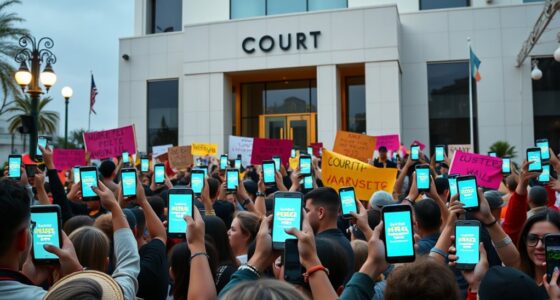If you look at the Fyre Festival scandal, you’ll see how Billy McFarland’s celebrity endorsements from Kendall Jenner and Bella Hadid made it appear luxurious and exclusive, encouraging thousands to buy tickets. However, these stars were often paid or undisclosed promoters, fueling the hype without meaning the event’s promises. As a result, chaos and legal fights erupted when reality fell far short. Keep exploring to understand how this deception led to major consequences for everyone involved.
Key Takeaways
- Celebrity endorsements by Kendall Jenner, Bella Hadid, and Hailey Bieber amplified the event’s allure, attracting thousands of attendees through social media hype.
- Influencers were paid or undisclosed promotional partners, misleading fans into believing the festival would deliver luxury experiences.
- The false marketing created legal liabilities for both influencers and organizers, contributing to lawsuits and fraud charges.
- Celebrity promotions helped conceal logistical failures initially, but exposed the scam when promises were unmet and chaos ensued.
- The scandal highlighted how influencer-driven marketing can be exploited, fueling legal action and damaging reputations in the entertainment industry.

Did you wonder how a luxury music festival in the Bahamas turned into one of the biggest frauds in recent history? The Fyre Festival was marketed as an exclusive event promising gourmet meals, luxury villas, and a once-in-a-lifetime experience on Great Exuma Island. You might have seen the stunning images shared by top influencers like Kendall Jenner, Bella Hadid, and Hailey Bieber on Instagram. They promoted the event without initially revealing they were paid, creating a buzz that made thousands of people enthusiastic to buy tickets. The festival’s promotional campaign exaggerated what attendees could expect, using sleek advertisements that promised paradise but delivered chaos instead. As a result, hundreds paid hundreds or even thousands of dollars, believing they’d experience true luxury.
A luxury Bahamas festival promised paradise but delivered chaos, fueled by influencer hype and deception.
The core of this fraud was Billy McFarland, the event’s organizer. He relied heavily on celebrity endorsements and social media hype to attract attendees and investors. These influencers and celebrities played a vital role in boosting the festival’s allure, often without disclosing they were compensated. The promotional materials were misleading, showing images of pristine beaches, gourmet food, and luxury accommodations that simply didn’t exist. When guests arrived in April and May 2017, they faced a different reality—poor infrastructure, inadequate security, and minimal food. Instead of the promised gourmet meals, attendees were handed packaged sandwiches, and many found themselves stranded in tents during rainstorms. Artist relations fell apart, and the event was plagued with logistical failures, turning what should’ve been a glamorous festival into a disaster.
Behind the scenes, McFarland’s deception extended to financial fraud. He pleaded guilty to wire fraud, admitting he defrauded investors and ticket buyers out of millions. He was ordered to forfeit $26 million of ill-gotten gains and served a six-year prison sentence. Multiple lawsuits followed, with victims seeking over $100 million in damages. Legal battles revealed that McFarland and his team had lied about the event’s readiness and financial stability, creating a web of lies to cover their tracks. The event’s collapse also led to crowdfunding efforts and merchandise auctions to try to compensate victims, but the damage was done. The brand’s reputation became synonymous with fraud, and the scandal set a legal precedent for holding influencers and event organizers accountable for false advertising. The sale of the Fyre Festival brand for just $245,300 underscores the extent of its financial decline, especially considering McFarland’s restitution of $26 million.
Furthermore, the scandal highlighted the importance of regulatory oversight in the entertainment industry, emphasizing the need for stricter accountability for promotional claims. Even after the disaster, plans for a new Fyre Festival in Mexico emerged, with ticket prices reaching up to a million dollars, though that was ultimately canceled. The original fraud and its fallout continue to serve as a cautionary tale about the dangers of influencer marketing, false promises, and unchecked greed. The Fyre Festival isn’t just a story of a failed event; it’s a stark reminder of how celebrity endorsements can be weaponized to fuel deception and legal chaos.
Frequently Asked Questions
What Legal Charges Did Billy Mcfarland Face Beyond Fraud?
You might wonder if Billy McFarland faced legal charges beyond fraud. Besides wire fraud related to the Fyre Festival, he was arrested for selling fake tickets to events like the Met Gala, Burning Man, and Coachella while on bail. These charges involved fraudulent misrepresentation, and he was prosecuted for attempting to deceive high-profile event attendees, leading to additional legal trouble beyond his initial festival-related fraud convictions.
How Did Celebrity Endorsements Impact the Festival’S Public Perception?
You see, celebrity endorsements profoundly shaped how the public viewed the festival, creating an illusion of luxury and exclusivity. When these influencers posted glamorous images, you believed the event was a dream experience. But once the truth emerged—worse conditions than promised—you felt betrayed. Their endorsements amplified anticipation, making the disaster even more shocking. It’s a clear reminder that celebrity hype can distort reality and influence trust, for better or worse.
Were There Any Early Warning Signs Ignored by Investors?
You might overlook early warning signs if you ignore social media posts exposing unprepared infrastructure, subpar accommodations, and logistical chaos. Financial irregularities, like missed vendor payments and inflated investor reports, signal trouble. Operational failures, such as postponed travel and missing essentials, also hint at deeper issues. Despite red flags from insiders and past fraud history, some investors still pursue the event, blinded by hype or false confidence.
What Compensation Options Are Available for Affected Attendees?
Imagine buying a ticket to paradise, only to find out it’s just a mirage. Sadly, you’re left with limited options. You might get a tiny slice of the $2 million settlement, but most funds go to legal fees. Some individuals, like Crossno and Thompson, won big in separate lawsuits. Still, overall, your chances of full compensation are slim due to limited assets and ongoing legal battles.
How Has the Fyre Festival Impacted Future Event Regulations?
You’ll notice that the Fyre Festival’s failure has prompted stricter regulations for future events. Authorities now emphasize transparency, proper permitting, and truthful marketing. You’ll see more oversight over influencer endorsements and clearer consumer protection policies. Event organizers are required to conduct thorough risk assessments and ensure financial accountability. These changes aim to prevent similar scams, rebuild trust, and promote safer, more transparent experiences for attendees like you in the future.
Conclusion
Like Icarus flying too close to the sun, Billy McFarland’s reckless celebrity endorsements soared, only to crash under the weight of deceit. The Fyre Festival serves as a cautionary tale, reminding you that fame and hype can’t substitute honesty. Stay vigilant, question the glitz, and remember that even the brightest stars can burn out when fueled by fraud. In this saga, the truth ultimately shines brighter than any illusion.










